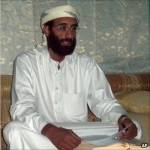30 September 2011
Islamist cleric Anwar al-Awlaki killed in Yemen
 US-born radical Islamist cleric Anwar al-Awlaki, a key al-Qaeda leader, has been killed in Yemen, the country's defence ministry said.
US-born radical Islamist cleric Anwar al-Awlaki, a key al-Qaeda leader, has been killed in Yemen, the country's defence ministry said.
US President Barack Obama said his death was a major blow to al-Qaeda.
Awlaki, of Yemeni descent, has been on the run in Yemen since December 2007.
The US said that as a key figure in al-Qaeda in the Arabian Peninsula (AQAP), he had played a "significant role" in plots to blow up US airliners and had sought use poison to kill US citizens.
Mr Obama is said to have personally ordered his killing last year.
Yemen's defence ministry statement said only that Awlaki had died in Khashef in Jawf province, about 140km (87 miles) east of the capital, Sanaa, "along with some of his companions".
US and Yemeni officials later named one of those as Samir Khan, also a US citizen but of Pakistani origin, who produced an online magazine promoting al-Qaeda's ideology.
Local tribal leaders told the AFP news agency that Awlaki had been moving around within Yemen in recent weeks to evade capture. Local people told AP he had been travelling between Jawf and Marib provinces when he died.
US officials said Awlaki's convoy was hit by a US drone and jet strike.
Mr Obama said that as the leader of external operations for AQAP, Awlaki, born in 1971, had taken "a lead in planning and directing efforts to murder innocent Americans" and was also "directly responsible for the death of many Yemeni citizens".
Analysis
This is the biggest blow to al-Qaeda since the killing of Osama Bin Laden. Anwar al-Awlaki was possibly the organisation's most inspirational cleric and ideologue in the Middle East.
Using the internet and an online magazine called Inspire, Awlaki encouraged his followers to attack Western targets. He has been blamed for inspiring US army major Nidal Hassan to kill his fellow soldiers in Texas and for inspiring the British woman Roshonara Choudhry to stab her MP Stephen Timms because he had supported the invasion of Iraq.
Awlaki was a charismatic cleric and fluent English speaker, and he may be hard for al-Qaeda to replace.
He said the death marked another "milestone in the broader efforts to defeat al-Qaeda and its affiliates", and paid tribute to US intelligence and the Yemeni security forces for their co-operation.
"This is further proof that al-Qaeda and its affiliates will find no safe haven anywhere in the world, " he said.
British Foreign Secretary William Hague said Awlaki had "demonstrated his intent and ability to cause mass terror".
One US official told the American network ABC that US intelligence had had "a very intense focus" on Awlaki for some time, waiting for a chance to strike.
The unnamed official said there had been "a good opportunity to hit him" on the 10th anniversary of the 9/11 attacks this year, but that "it never materialised".
'Poison plot'
BBC security correspondent Gordon Corera says the killing is significant because Awlaki's use of modern media meant he was able to reach out and inspire people susceptible to radicalisation.
Al-Qaeda in the Arabian Peninsula
- Formed in January 2009 by a merger between al-Qaeda in Saudi Arabia and Yemen
- Based in eastern Yemen
- Led by Nasser al-Wuhayshi, a Yemeni former aide to Osama Bin Laden. Deputy leader is Saudi ex-Guantanamo inmate Said al-Shihri
- Aims to topple Saudi monarchy and Yemeni government, and establish an Islamic caliphate
- Came to prominence with Riyadh bombings in 2003, and 2008 attack on US embassy in Sanaa
- Says it was behind an attempt to blow up US passenger jet in December 2009
He is believed to have played a significant role in the Christmas 2009 Detroit airline bomb attempt and in the plot which sent two bombs in printer cartridges on US-bound cargo planes in 2010. They were intercepted in the UK and Dubai.
He has also been implicated in the 2009 US army base killings in Fort Hood, Texas, and a failed bombing in New York's Times Square in 2010.
Washington said he had sought to use poisons including cyanide and ricin in attacks.
When he was imam of a San Diego mosque in the 1990s, his sermons were attended by two future 9/11 hijackers, Khalid al-Midhar and Nawaf al-Hazmi.
He also lived in the UK from 2002-04, where he spent several months giving lectures to Muslim youth.
In a video posted in November last year he called for the killing of Americans, saying they were from the "party of devils".
Weeks later, he survived an air strike in Shabwa province in which at least 30 militants were killed.
He has been reported dead in the past following US air strikes on southern Yemen in December 2009 and November 2010.

He was the target of a US drone attack that killed two al-Qaeda operatives in southern Yemen on 5 May.
The death comes amid concerns in Washington about the impact of Yemen's political crisis on its ability to tackle al-Qaeda militants.
President Ali Abdullah Saleh is facing a widespread protest movement, along with an armed insurrection by renegade army units and tribal fighters.
Mr Saleh, who was injured three months ago when his residence was shelled, returned last week after treatment in Saudi Arabia.
In an interview published on Thursday, he said he would not stand down, as promised in a deal brokered by Gulf States, if his opponents are allowed to stand in elections to succeed him.
http://www.bbc.co.uk/n
19:40 Posted in Real Islam, UNITED STATES | Permalink | Comments (0) | ![]() Facebook |
Facebook |




















The comments are closed.